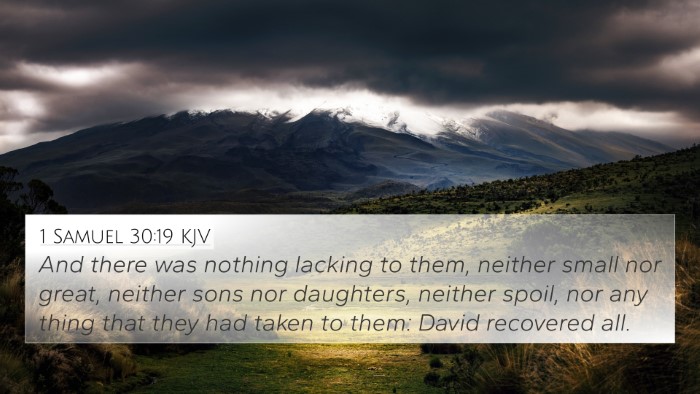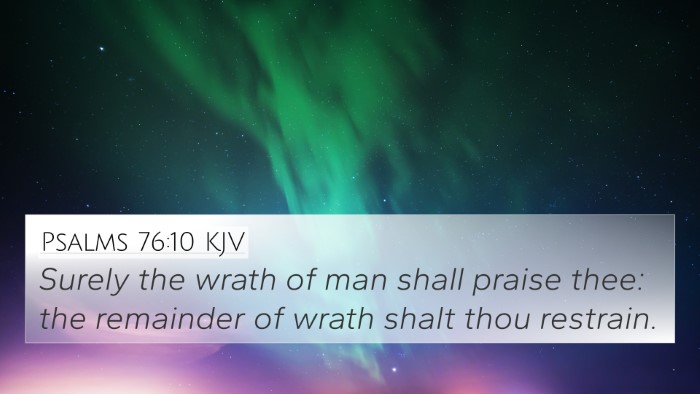Understanding 1 Samuel 30:2
Bible Verse: 1 Samuel 30:2
Verse Context: This verse describes a moment of profound distress for David and his followers, as they discover that their families have been taken captive.
Summary of 1 Samuel 30:2
In this pivotal moment, David and his men return to Ziklag to find their city burned and their loved ones abducted by raiders. The emotional weight of this encounter is profound, showcasing human vulnerability, the consequences of leadership, and the desperate situation that can arise in times of conflict.
Commentary Insights
- Matthew Henry: Henry emphasizes the sorrow experienced by David and his men. He notes that their grief was compounded by their helplessness, which reflects the reality of human suffering. The attack served not only to strip them of their families but also challenged their faith and commitment to God.
- Albert Barnes: Barnes highlights the significance of Ziklag and the loss of David’s spouses, articulating how the situation serves as a reminder of the precarious nature of worldly attachments. David's men were filled with distress, showcasing the depths of human despair during trials. He makes connections to similar themes of mourning and recovery seen throughout the scriptures.
- Adam Clarke: Clarke focuses on the implications for David’s leadership. He suggests that the impact of this loss reflects on David’s accountability to his men and their families. Clarke also mentions the ways that God can turn despair into deliverance, foreshadowing the eventual rescue and restoration that will follow.
Key Themes
The themes of loss, desperation, leadership, and divine intervention are prevalent in 1 Samuel 30:2. Each commentary offers unique perspectives on how these themes are expressed within the verse.
Cross-References
This verse holds connections with several other scriptures that provide a layered understanding of its meaning. Here are key cross-references:
- Psalm 30:5 - “Weeping may endure for a night, but joy comes in the morning.” This verse resonates with the theme of despair followed by hope.
- 1 Chronicles 12:22 - Refers to the numerous warriors who joined David, reflecting on the importance of companionship in times of distress.
- Exodus 14:14 - God’s promise to fight for His people can be linked to the eventual deliverance found in the narrative.
- 2 Samuel 1:13-16 - David’s reaction to loss parallels his response in 1 Samuel 30, emphasizing grief and the sorrow that accompanies loss.
- Lamentations 3:22-23 - The compassion of God when one is in dire straits reflects the overarching theme of His enduring mercy.
- Psalm 52:5 - This verse reflects on how God will destroy the wicked, fostering hope amidst adversity.
- Philippians 4:6-7 - The call to prayer in times of distress serves as a practical response to the challenges faced in the narrative.
- 2 Timothy 4:18 - Paul speaks of deliverance from peril, a direct reflection of the deliverance that awaits David.
- Isaiah 40:31 - The reassurance that those who wait on God will find strength, paralleling David’s eventual reliance on God for recovery.
- James 1:2-4 - Encouragement to consider trials joyfully as they produce perseverance, relevant in the context of David’s experience.
Connections Between Bible Verses
The inter-Biblical dialogue around grief, leadership, and divine intervention can also be explored through these relationships:
- Thematic Bible Verse Connections: The themes of loss and recovery are universal throughout scripture, with verses like Job 42:10 showcasing how restoration follows suffering.
- Comparative Bible Verse Analysis: Analyzing the emotional response of David alongside other Biblical figures, such as Job and Moses, elucidates shared human experiences in the face of adversity.
- Scriptural Cross-Referencing: Linking narratives where God intervenes after moments of despair can deepen the understanding of His faithfulness throughout scripture.
Tools for Bible Cross-Referencing
Utilizing tools such as a Bible concordance or a Bible cross-reference guide can enhance the study of scriptures like 1 Samuel 30:2. These tools facilitate:
- How to use Bible cross-references: Gaining insight into thematic and narrative connections throughout the Bible.
- Bible reference resources: Exploring the relationships between verses to uncover deeper meanings and messages.
- Comprehensive Bible cross-reference materials: Educating oneself on the broader context of Biblical narratives and themes.
Conclusion
1 Samuel 30:2 encapsulates a moment of profound grief and sets the stage for understanding leadership and divine intervention within the scriptures. By exploring cross-references, we can uncover connections that inform both the historical context and contemporary applications of these themes in our lives today.







